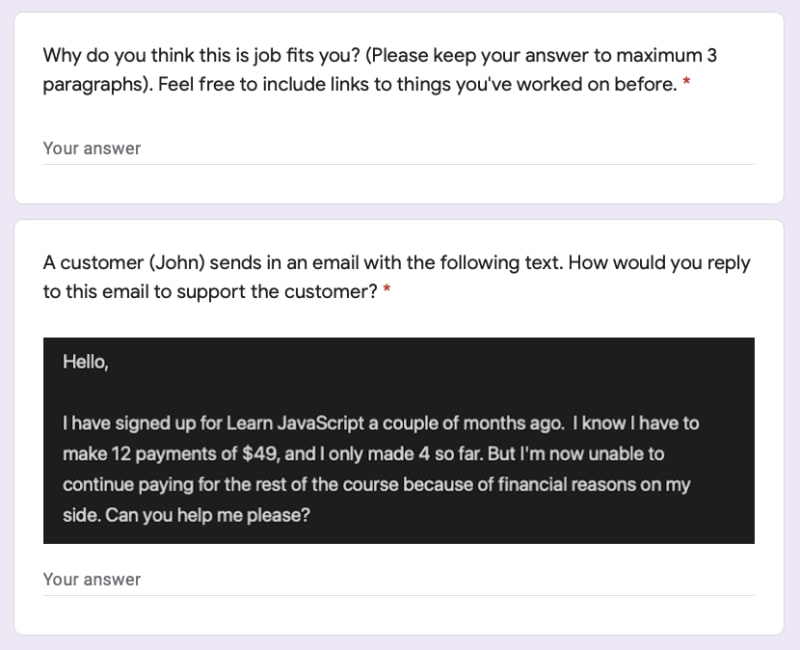I wanted to hire an assistant to help me with the workload for my business. After many failed attempts (and hence lots of paralysis), I'm happy to say I found a person who's a joy to work with. Her name is Jen.
I want to talk about the hiring process and what I learned about each step — mostly to consolidate my learnings. It'll be a bonus if this helps you work through any kinks when you're in that stage.
Note: these are my opinions and don't reflect what other hiring managers or employers think.
The Hiring Process
I split the hiring process into 3 stages:
- The Application — (200+ responses)
- The Interview — (10 people)
- The Paid Trial — (5 people)
Completing the entire process took about 2 weeks. I ended up hiring 2 people even though I only looked for one.
Here are some brief notes about the timeline.
- Most quality candidates replied within the first 3-4 days. After 4 days, I had enough quality candidates to work with. I closed the applications after 7 days. (Nobody caught my eye from Day 5 to Day 7).
- I started responding to applicants who caught my eye immediately. They all booked interview slots within the next 3-4 days. (This helps to keep the process tight and manageable).
- For applicants that passed an interview, I gave them a 3-hour task (paid) with a deadline of 1 week. All applicants completed the task.
Note: timings stated here are estimates
Writing the Job Description
I realized you only have to say three things for a good job description:
- About the Job — share the actual job scope (and variability, if any)
- About the Company — share information about your company and its stage so applicants have an idea of what your company is about.
- About the requirements — share the qualities you need from candidates.
Here's my job description in case you were wondering what it looked like.
Discard your fantasies
Writing the job description is the most challenging part of the hiring process. Everyone wants to hire a rockstar for their team — it's tempting to add high requirements to find these people.
This is a big mistake.
The biggest problem with a "rockstar search" is you're not being honest about who you're hiring for your job. This dilutes your ability to filter candidates in the application process.
Second, high requirements deter people from applying. You may receive less quality candidates by setting your requirements too high.
Third, why would a rockstar want to work with you? What do you have to offer them? If you don't have much to offer, you won't be able to hire one, much less keep them.
So it's better to discard your fantasies and look for someone real — list your minimum requirements instead of your ideal requirements. (That's why they're requirements and not ideals).
Be honest to set expectations
When you can be honest with yourself, you can set good expectations that others can honour. This one step removes a lot of candidates that don't align with what you offer.
Here are a few examples from my job description:
- Pay is $15USD per hour — Perhaps the best expectation I set. Nobody has to play the negotiation games once this value is fixed.
- The company is small (just 2 of us) — This removes people who are looking for jobs in big corporations
- This is a part-time role, but there's a possibility of transitioning into full-time — This filters out people who aren't interested in starting small with me now.
Don't copy other people's job description
It's tempting to copy other people's job descriptions to simplify the process, but it doesn't work.
It doesn't work because the intention and energy put forth into their role doesn't match the role you're advertising. Sometimes you find qualities you think are "good to have", but they detract you from what you originally wanted.
So it's best to brainstorm what you actually need and list the requirements yourself. This gives you a chance to create the written application and any tests to suit the role you want to hire for.
The Written Application
I started with a written application that contains only two questions:
Why these two questions?
I used these two questions because they're easy to answer so candidates don't overthink — which is important for doing jobs effectively and efficiently as an assistant.
Keeping the process simple
I kept the process simple with Google Forms. Through the process, I noticed I loved two features of Google Forms.
First, I can cycle through responses individually by clicking the individual tab.
Second: I can delete people people who don't make the mark during my first pass.
Filter Heavily
I filtered the responses heavily since I only let myself interview 10 people. This is an arbitrary limit I imposed on myself to train myself to filter properly.
I filtered people out when:
- They had grammar mistakes.
- They couldn't form coherent sentences.
- They sounded desperate (since this energy doesn't help in the work I do).
- I got the feeling they didn't bother researching my company before they wrote the reply.
From there I picked people (first come, first served) who seemed to have the ability to communicate effectively. Eventually, I invited 12 people for interviews. It's a little bit over my self-imposed limit, but I think this is good enough.
Of the 12 candidates shortlisted, 10 turned up for the interview.
The Interview
I limited each interview to 30 minutes (again, an arbitrary number) because I wanted to keep things tight. I wanted to see if I could find out enough about a person within the first 30 minutes.
I set up the meeting so it's more of an informal chat between us — I want to get to know each other better and whether we have a good chemistry to work together.
There were only two questions I asked everyone:
- Why did they decide to apply to this job?
- What are their next 3-5 years going to be like if everything goes smoothly for them?
Finding the right person
I looked out for a couple of things:
- Do they have time to work with me
- What are their goals in life and whether that aligns with this position I'm seeking to hire.
- Whether it feels easy for me to converse with them
- Whether they drain my energy or contribute to the conversation
Notice I wasn't looking for ambition here: I wanted someone who's not very ambitious so I can rely on this person for a long time. (So ambition isn't always good!).
Be Open Minded
The interview isn't only about finding the "right" person for the job. The purpose is to find out who this person is and whether they can support you. If you find someone perfect for the job, great! But don't discount anyone who isn't a perfect fit.
In this case, I found a few gems:
- A person who's hungry, passionate, and thinks quickly — I ended up hiring him too because I felt he could help with some analysis that I needed. (But it didn't work out in the end).
- A person with emotional stability and a good listening ear — I didn't hire her because I didn't need this role now. This may be someone I need when doing outreach, but that's not what I'm looking for now.
- A person with experience building businesses and delegating jobs — I don't know why this guy applied, but I may have found someone who can give me advice on building businesses!
So be open minded. You never know who you speak to and how they can help you in various ways!
Mini Paid Project
I offered each promising candidate a mini-project. I gave them two tasks:
- Proofreading my articles (which is one thing I desperately need help with!)
- A Research task (because I need this person to conduct some research and present findings for me, so I don't have to research myself).
I also gave them the following instructions:
- Please use a maximum of 3 hours for these two tasks. It's okay if you don't complete both tasks.
- Please track your time and indicate how you spent your time between these two tasks. If you can, send in a time-tracking report as well. (Optional but preferable).
This paid project simply tells me how they work and whether the quality of work is what I intend to have.
Paid Trial
I hired two people through the interviews. I onboarded them together and shared my expectations with them:
- I expect them to be independent
- They would be responsible for work handed to them
- They would ask questions if they have any
- They would be honest and of integrity
- We would not be nice, but we would be kind — highly inspired by Jason Lengstorf for this one.
We held one meeting each week as a team, beginning with a weekly review of four questions
- What's working?
- What's not working?
- What's stopping you from performing at your best?
- What can be improved?
These four questions allowed me to see how each person is able to be honest with themselves about the jobs they were asked to do in the previous week. They also allowed me to improve from the feedback that I gathered from the team.
After the weekly review and some social chit-chat (about 30mins total), we would break into individual sessions where I delegate tasks and explain what these tasks are for.
I spent an average of about 2 hours per week on the meetings themselves.
Don't hire people you're not ready for
I wasn't ready to hire two people — hiring two people would drain my finances and create more stress — but I thought I would give it a go anyway.
I hoped the extra person could grow quickly and become someone I could rely on to become a great product manager. I had confidence that I would be able to train someone up relatively quickly.
I was wrong — the person didn't show a good trajectory towards what I needed within our 30-day paid trial. I ended up letting him go (with much heartache).
Upon reflection, I realized I jumped onto three fantasies/delusions:
- People can grow up very quickly, so they can be trained very quickly. I probably had this fantasy because I was forced to grow up quickly when I was young).
- I need to help people grow — people here refers to everyone and anyone I come across. So if I hired someone I need to train them until they become experts.
- I am relatively good at training people
My greatest mistake is taking a gamble on the candidate without filtering him for the skills I needed him to have. I relied on blind faith that his positive and will-do attitude will tide him through.
Although I have no doubt that his attitude will serve him in the long term, I realized I was unable to train this person up.
Why?
Two reasons:
- I realized it was exceptionally hard to train a person if they don't already have basic foundations in the required skills.
- I don't align with paying someone to learn from scratch on the job - I don't have the luxury to pay people and provide them value when they're not providing me any value in return. After all, I'm not doing charity here.
I ended up letting him go because his presence was creating a lot of negative energy for me and all I could think about was how to handle this person, and not expanding my business or pouring energy into my work.
Hiring this person, although wrongly, was a good learning experience since it allowed me to take a closer look at the delusion I had – that I needed to help people grow. I realized I wanted to help people grow, but I could not fulfil this delusion of mine for everyone.
Final Notes
We need to know why we're hiring and what we're hiring for. We can only find the right (or best-fit) person based on complete honesty of the criteria we set.
We cannot have delusions and fantasies about who we hire. We do not run charities and we cannot afford to support people at the expense of our business and lives.
We need to vigorously test and filter people out accordingly. I cannot expect myself to be great at interviews and sniffing people out at a glance because I'm not trained to do so, and I shouldn't have that delusion either. So a paid trial is necessary.
If the paid trial doesn't work, I need to fire the person and face the fact that I hired the wrong person for my business. I also need to understand where I was wrong so I won't make the same mistake again.
If you're looking for employment, please remember that employers look for people to help them — you will have a much better chance if you demonstrate you can help them, instead of saying you want to learn from them. (This is just my opinion, of course).
Thanks for reading. This article was originally posted on my blog. Sign up for my newsletter if you want more articles to help you become a better frontend developer.










Latest comments (0)